Prof Steffi Krause
Dr. rer. nat., MRSC, FHEA
News
July 2025 | ||
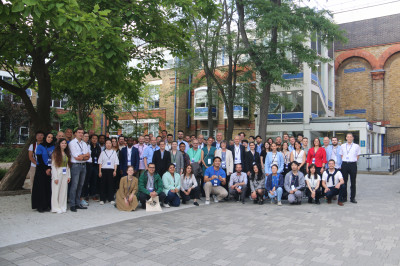 Global minds converge as Queen Mary hosts EnFI202514 July 2025On 7th and 8th July, the School of Engineering and Materials Science hosted the 16th International Workshop on Engineering of Functional Interfaces (EnFI2025), which was attended by 86 scientists and engineers from 19 universities, institutes and companies from seven different countries in Europe and the Far East. We are proud to be … [more] | ||
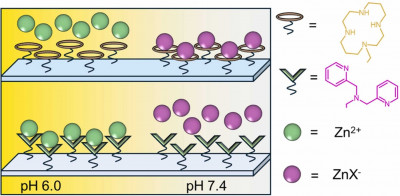 Muchun Zhong develops simplified sensor for zinc ion detection11 July 2025Muchun Zhong, a member of Steffi Krause's group, has developed a novel, effective way for detecting zinc ions with a potentiometric sensor. The zinc ion is among the most abundant trace metal ions in the human body, which is intimately involved in a wide range of physiological and pathological … [more] | ||
June 2025 | ||
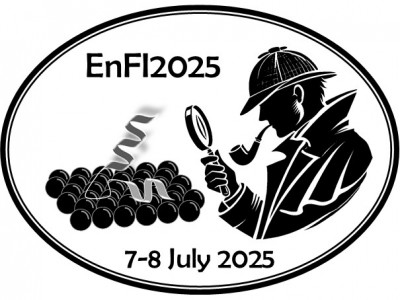 Registration for the 16th International Workshop on the Engineering of Functional Interfaces (EnFI2025) is closing soon!18 June 2025Last chance to register for the 16th International Workshop on the Engineering of Functional Interfaces (EnFI 2025) is on 19 June 2025. The meeting takes place in the People's Palace at Queen Mary University of London on 7th and 8th July 2025. EnFI is a dynamic, multidisciplinary international workshop. It covers all aspects … [more] | ||
April 2025 | ||
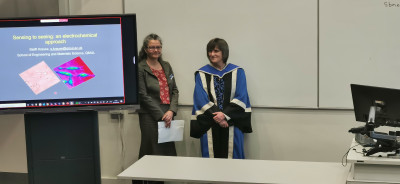 Prof Steffi Krause gives inaugural lecture on sensors23 April 2025On Wednesday 5th March, Prof Steffi Krause gave her inaugural lecture to mark her promotion to Professor of Electroanalytical Systems. In ‘Sensing to seeing: an electrochemical approach’, Prof Krause explores how Sensors have revolutionised the way we monitor our environment, from measuring pollutants to diagnosing diseases using the … [more] | ||
March 2025 | ||
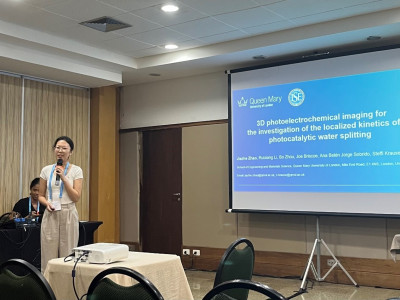 Jiazhe Zhao Wins Best Oral Presentation at International Electrochemistry Conference28 March 2025Jiazhe Zhao was awarded the Best Oral Presentation Award at the 39th Topical Meeting of the International Society of Electrochemistry (ISE), held in Natal, Brazil. The conference focused on "The Role of Electrochemistry in Sustainable Energy and the Environment.” Her standout presentation, titled ‘3D Photoelectrochemical Imaging for … [more] | ||
September 2024 | ||
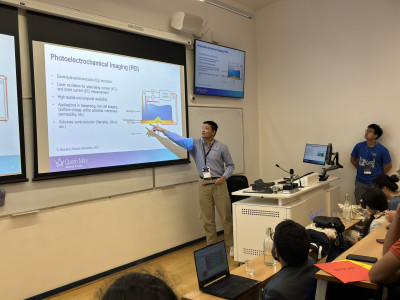 Ruixiang Li is awarded best talk for his presentation at the BioMedEng24 Conference6 September 2024Ruixiang Li received an award for the best talk in the Biomedical Imaging & Biosensors session of the BioMedEng24, which was held in the School of Engineering and Materials Science at Queen Mary University of London. His lively presentation on Live Cell Imaging with Photoelectrochemical Imaging and Scanning Ion Conductance … [more] | ||
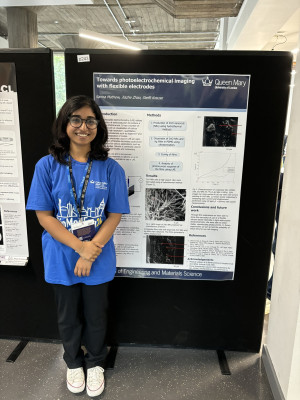 Sarina Mathew presents the results of her intercalated project at the BioMedEng24 Conference6 September 2024Sarina Mathew, one of our intercalated students in the School of Engineering and Materials Science (SEMS) at Queen Mary University of London (QMUL), presented her results as a poster at the BioMedEng24, which was held in SEMS at QMUL in September 2024. Sarina developed novel flexible electrode materials that will be … [more] | ||
August 2024 | ||
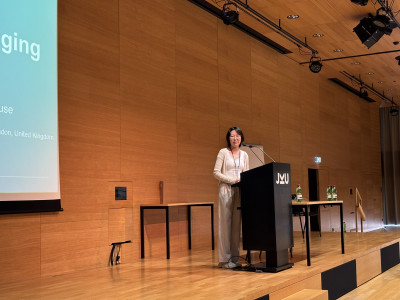 SEMS' PhD Students, Jiazhe Zhao and Ruixiang Li, present at the International Workshop on Engineering of Functional Interfaces - EnFi2024 - in Linz, Austria29 August 2024Two of our PhD students, Jiazhe Zhao and Ruixiang Li, presented at the 15th International Workshop on Engineering of Functional Interfaces (EnFi2024) , which was held at The Institute of Chemical Technology of Inorganic Materials at Johannes Kepler University Linz in Austria. Jiazhe presented a talk and poster entitled "3D … [more] | ||
March 2024 | ||
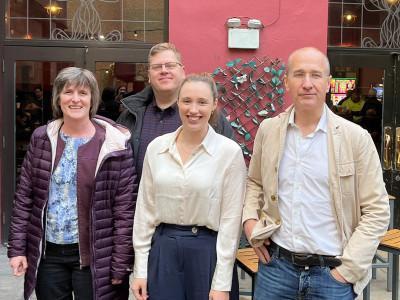 Rachel Jacques passes her PhD viva21 March 2024Congratulations to Rachel Jacques who passed her PhD viva yesterday. Rachel's thesis is entitled 'Towards in-situ optical and electrochemical imaging to monitor action potentials for in-vitro and in-vivo applications'. She was supervised by Steffi Krause and Lei Su. Rachel pioneered the measurement of action potentials with single cell resolution … [more] | ||
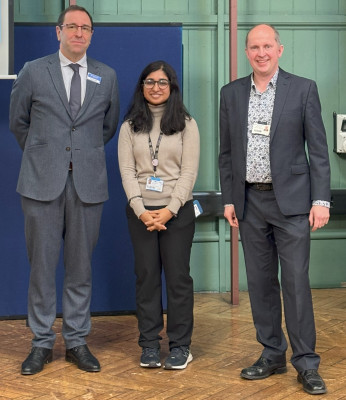 Undergraduate research posters win prizes at ILF18 March 2024Students from across the School of Engineering and Materials Science, including the Queen Mary Centre for Undergraduate Research (QMCUR), third year BEng students, and the Intercalated BSc in Bioengineering presented their research projects at the Industrial Liaison Forum on 6th March 2024. All students engaged in lively discussion with our academics … [more] | ||
January 2024 | ||
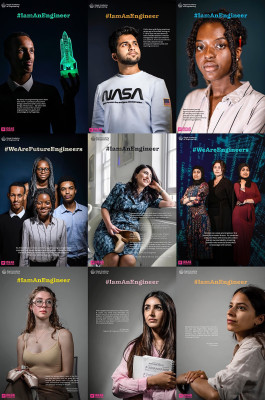 Engineers Celebrate Athena Swan Success18 January 2024Gender equality recognised by Athena Swan Bronze Award First recognised in 2010, the School has now had this award conferred for another five years until 2029, where the conditions were met "directly and fully". The Athena Swan Charter works across the globe to support and transform gender equality in Higher … [more] | ||
June 2023 | ||
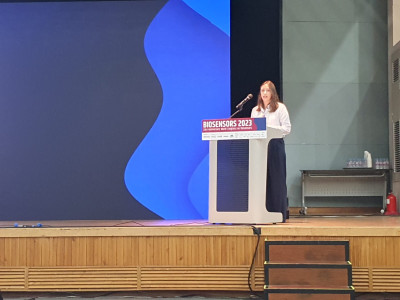 Rachel Jacques presents talk at prestigious World Congress on Biosensors in Busan, South Korea8 June 2023The World Congress on Biosensors is the largest and most well-established conference in the field, attracting approximately a thousand attendees from industry, academia and government organisations worldwide. Rachel presented a talk entitled "Highly sensitive imaging of cardiomyocyte action potentials with LAPS through control of the contact force between organoid … [more] | ||
December 2022 | ||
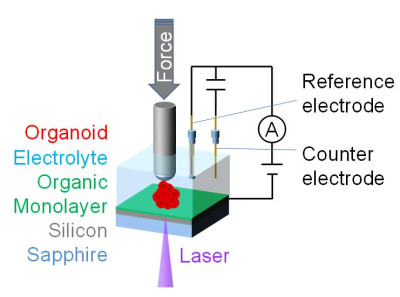 Controlling the contact force between organoid and light-addressable potentiometric sensor enables highly sensitive monitoring of cardiomyocyte action potentials21 December 2022Monitoring of action potentials of beating cardiac cells called cardiomyocytes can give insights into physiological and disease mechanisms and aid the development of novel therapeutics for the treatment of cardiac arrhythmia, i.e., irregular heartbeats. Patch clamp measurements are the gold standard in electrophysiological measurements, but are difficult to operate … [more] | ||
November 2022 | ||
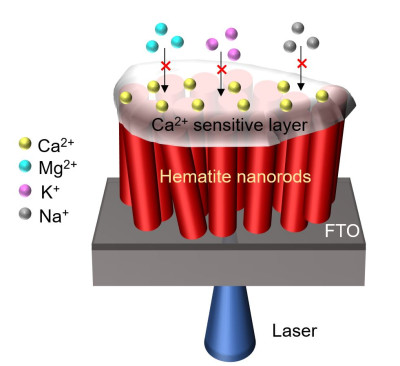 Hematite nanorods – a promising material for photoelectrochemical sensing and imaging10 November 2022Hydrothermally grown hematite nanorods have been shown to be an excellent substrate for photoelectrochemical imaging and sensing. The material displayed enhanced photocurrent compared to hematite films, good stability, excellent spatial resolution and good sensitivity to pH. Coupling the hematite nanorods with a thin calcium ion selective PVC membrane, we obtained … [more] | ||
July 2022 | ||
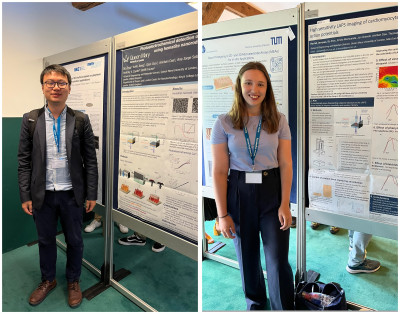 The Electrochemical Sensors group attends the International Workshop on Engineering Functional Interfaces (EnFI) 2022 in Maastricht6 July 2022Three members of our group attended the EnFI in Maastricht. The conference focuses on the field of surface engineering in its broadest sense. This rapidly growing, interdisciplinary field instigates collaborations between scientists from multiple disciplines as it contains elements from physics, engineering, biology, medicine, informatics and chemistry. Both, Rachel Jacques … [more] | ||
April 2022 | ||
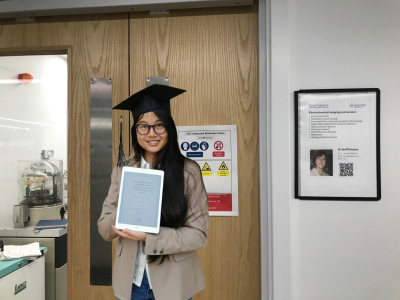 Congratulations to Muchun Zhong on Passing Her PhD Viva29 April 2022Congratulations to Muchun Zhong passed her PhD viva on Friday 29 April 2022. Muchun’s thesis was titled "Investigation of silicon (on sapphire) with monolayers in LAPS and photoelectrochemical sensors". She was supervised by Steffi Krause and Michael Watkinson. Muchun presented her work at the International Symposium on … [more] | ||
March 2021 | ||
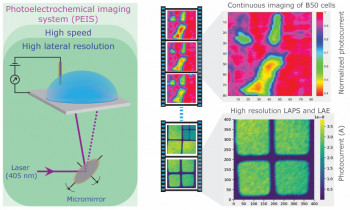 Photoelectrochemical imaging with high spatiotemporal resolution: publication in Biosensors and Bioelectronics1 March 2021Electrochemical or photoelectrochemical imaging of living cells has great potential for label-free, functional monitoring of cell responses, but is either relatively slow or suffers from poor resolution. Detailed electrochemical imaging has been limited to single-cell investigations, making it time-consuming to produce biologically relevant data. Our publication “Photoelectrochemical imaging system … [more] | ||
February 2021 | ||
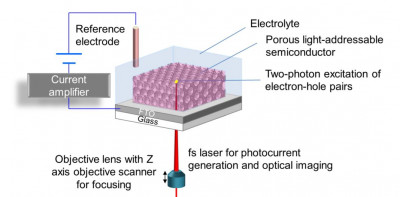 EPSRC New Horizons grant on 3D photoelectrochemical imaging1 February 2021Prof Steffi Krause, Dr Joe Biscoe, Dr Thomas Iskratsch and Dr Bo Zhou have been awarded an EPSRC New Horizon’s grant (EP/V047523/1) of £200k to develop new measurement technology for 3D photoelectrochemical imaging. Electrochemical imaging techniques are powerful tools for the investigation of topography, charge and … [more] | ||
December 2020 | ||
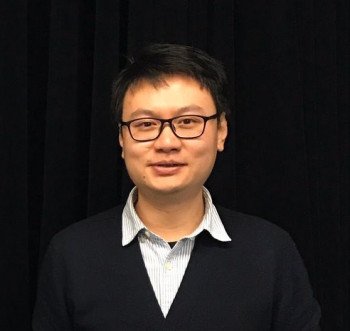 Bo Zhou Passes his PhD Viva9 December 2020Congratulations to Bo Zhou who passed his PhD viva yesterday. Bo's thesis title is "Photoelectrochemical imaging of live cells using semiconductor substrates". He was supervised by Steffi Krause and Karin Hing. He presented his work at the International Symposium on Bioelectrochemistry and Bioenergetics in 2019, published two full … [more] | ||
October 2020 | ||
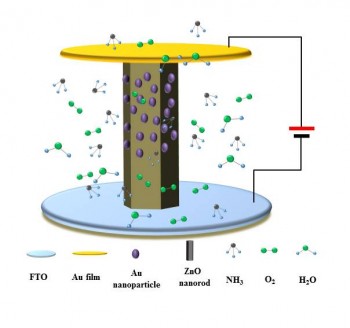 Scientists develop ammonia gas sensor based on a zinc oxide nanorod-gold Schottky diode9 October 2020Ying Tu's paper describing a novel room temperature sensor for ammonia has been accepted by ACS Sensors. As ammonia is gaining importance in the production and storage of hydrogen, there is an increasing demand for energy-efficient ammonia detectors. The device described in this paper boasts low power consumption, good … [more] | ||
October 2019 | ||
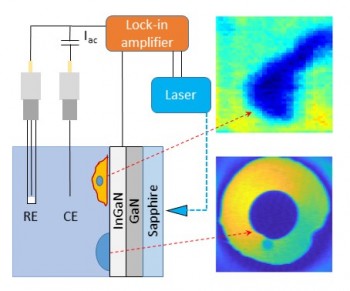 InGaN suitable as a substrate for photoelectrochemical imaging in life sciences11 October 2019Bo's paper on the use of InGaN as the semiconductor substrate for AC photoelectrochemical imaging has been accepted by Sensors. AC photocurrent imaging at metal oxide semiconductors auch as ITO and ZnO nanorods has been shown to suitable for bioimaging applications such as the measurement of the negative surface … [more] | ||
September 2019 | ||
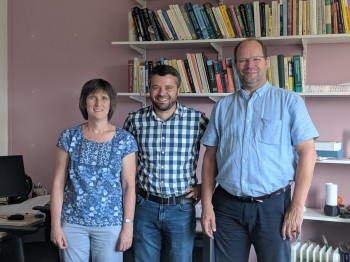 Success for SEMS Academics in 2019 Promotion Round17 September 2019Following the 2019 Promotion Round we are very pleased to announce that eleven members of staff from SEMS have been promoted. This is a fantastic achievement that demonstrates the quality of work undertaken by staff in the School. In particular congratulations to our three new Professors - Julien Gautrot, Steffi Krause … [more] | ||
June 2019 | ||
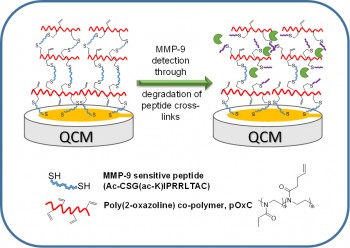 ACS Biomacromolecules paper on peptide cross-linked poly(2-oxazoline) as a sensor material for the detection of proteases accepted7 June 2019Norlaily Ahamad's paper on peptide cross-linked poly(2-oxazoline) as a sensor material for the detection of proteases has been accepted by Biomacromolecules. Increased levels of active proteases are frequently associated with inflammatory conditions, and there is increasing demand for point of care devices for monitoring inflammation. Norlaily cross-linked a … [more] | ||
May 2019 | ||
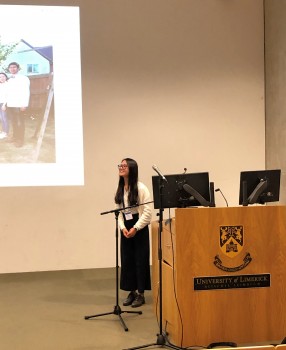 Muchun and Bo present at the XXV. International Symposium on Bioelectrochemistry and Bioenergetics in Limerick28 May 2019Muchun Zhong's and Bo Zhou's presentations were well received by the Bioelectrochemistry community. Muchun presented her work on light-addressable potentiometric sensors for the detection of zinc, and Bo talked about photoelectrochemical imaging with iron oxide nanorods. [more] | ||
April 2019 | ||
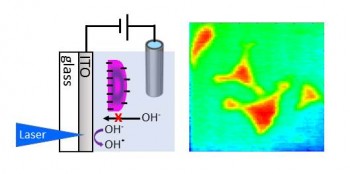 First report of cell surface charge mapping with a photoelectrochemical imaging system appears in Analytical Chemistry15 April 2019Fan's and Bo's paper on the photoelectrochemical imaging of cell surface charges has been been accepted by Analytical Chemistry. Photoanodic currents at indium tin oxide (ITO) coated glass immersed in an electrolyte solution were shown to be sensitive to surface charge, pH and impedance. Our laser scanning setup … [more] | ||
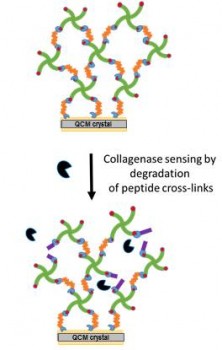 Norlaily's paper about collagenase sensor accepted2 April 2019Our paper entitled 'Collagenase Biosensor Based on the Degradation of Peptide Cross-Linked Poly(ethylene glycol) Hydrogel Films' written by Norlaily Ahmad, Burcu Colak, De-Wen Zhang, Michael Watkinson, Remzi Becer, Julien Gautrot and Steffi Krause has been published in Sensors 2019, 19(7), 1677; doi:10.3390/s19071677. Peptide cross-linked hydrogels were deposited on gold coated, piezoelectric … [more] | ||
February 2019 | ||
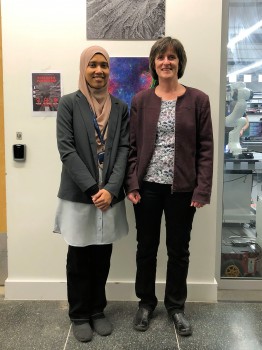 Norlaily Ahmad passes her PhD viva28 February 2019Congratulations to Norlaily Ahmad who passed her PhD viva today. Norlaily's thesis title is "Biosensor for matrix metalloproteinase-9 (MMP-9) based on peptide-linked polymers". She was supervised by Steffi Krause and Remzi Becer and also had significant input from Julien Gautrot and Michael Watkinson. She presented her work … [more] | ||
October 2018 | ||
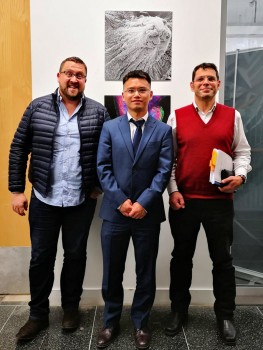 Congratulations to Ying Tu24 October 2018Congratulations to Ying Tu who passed his PhD viva on Wednesday 24th October 2018. Ying did his PhD on the "Investigation of ZnO nanorods as chemical and biological sensors" under the supervision of Steffi Krause and Joe Briscoe. [more] | ||
June 2018 | ||
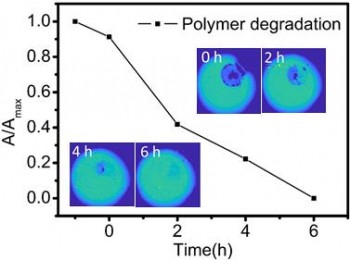 Analytical Chemistry paper accepted22 June 2018Ying's paper on Light-Addressable Potentiometric Sensors (LAPS) using ZnO Nanorods as the Sensor Substrate for Bioanalytical Applications has been accepted by Analytical Chemistry. In this work, for the first time, a 1D material - ZnO nanorods with a high aspect ratio - was developed as a new substrate material for … [more] | ||
Invited talk at the 4th Conference on Impedance-Based Cellular Assays8 June 2018Steffi Krause gave an invited talk on "Light-addressable potentiometric sensors for cell imaging applications" at the 4th Conference on Impedance-Based Cellular Assays, which was held in Edinburgh from 6th to 8th June 2018 (http://www.ibca2018.net/). [more] | ||
May 2018 | ||
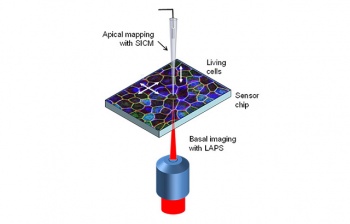 Queen Mary awarded funding to build instrument which will revolutionise monitoring of cellular processes29 May 2018Queen Mary University of London has been awarded funding to lead a joint project to build an instrument which will revolutionise the monitoring of cellular processes in tissues that line organs. The grant from the Engineering and Physical Sciences Research Council (EPSRC) has a total value of £823,329 over three … [more] | ||
December 2017 | ||
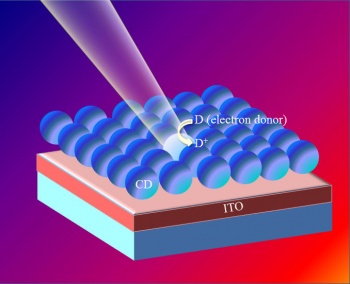 Materials Horizons paper on the photoelectrochemical response of carbon dots accepted14 December 2017Dewen's paper on photoelectrochemical imaging with carbon dots has been accepted by Materials Horizons. This work started a new collaboration of our group with the research groups of Magda Titirici, Oliver Fenwick and Andrei Sapelkin. Here are the details of the publication: De-Wen Zhang, Nikolaos Papaioannou, Naomi Michelle David, Hui … [more] | ||
November 2017 | ||
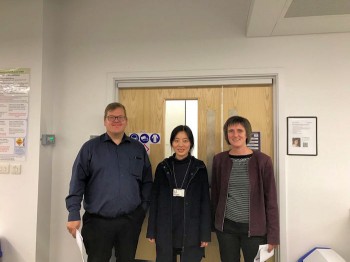 PhD success for SEMS student Fan Wu16 November 2017Congratulations to Fan Wu for successfully defending her PhD thesis “Investigation of light-addressable potentiometric sensors for electrochemical imaging based on different semiconductor substrates”. Fan was supervised by Steffi Krause and Michael Watkinson. [more] | ||
December 2016 | ||
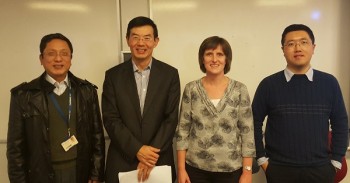 Three SEMS colleagues awarded HEA Fellowships2 December 2016Steffi Krause, Pihua Wen & Guang Li are the latest three staff in SEMS to have completed the ADEPT application. This means that all three have also now been awarded their Fellowships of the Higher Education Academy and can now use the designation FHEA after their names. Congratulations to all three … [more] | ||
Other News
November 11th, 2017:
Ying Tu's first paper accepted: Ying Tu, Shuqun Chen, Xuan Li, Jelena Gorbaciova, William P. Gillin, Steffi Krause, and Joe Briscoe, Control of oxygen vacancies in ZnO nanorods by annealing and their influence on ZnO/PEDOT:PSS diode behaviour, Journal of Materials Chemistry C
November 10th, 2017: Prof. Torsten Wagner visits our lab
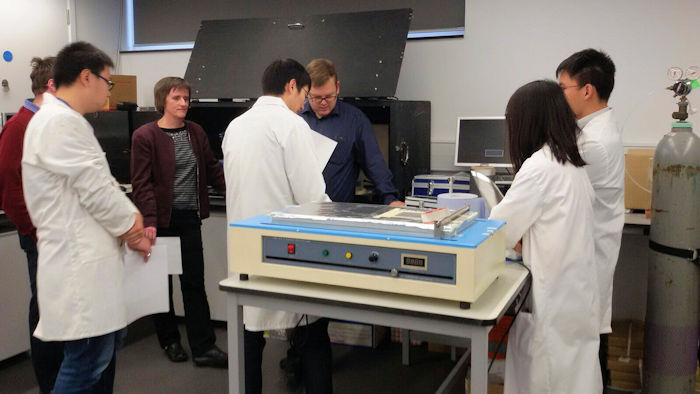
November 9th, 2017: Congratulations to Fan Wu for passing her PhD viva!
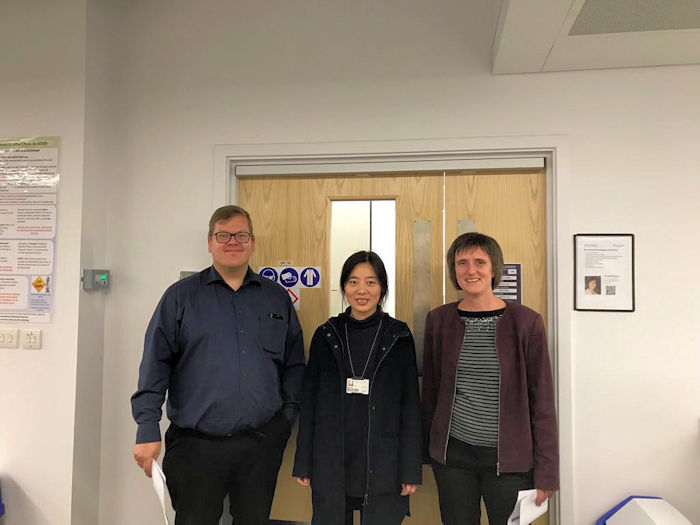
The group celebrates in the Half Moon with the examiners, Prof Torsten Wagner and Dr Isaac Abrahams.
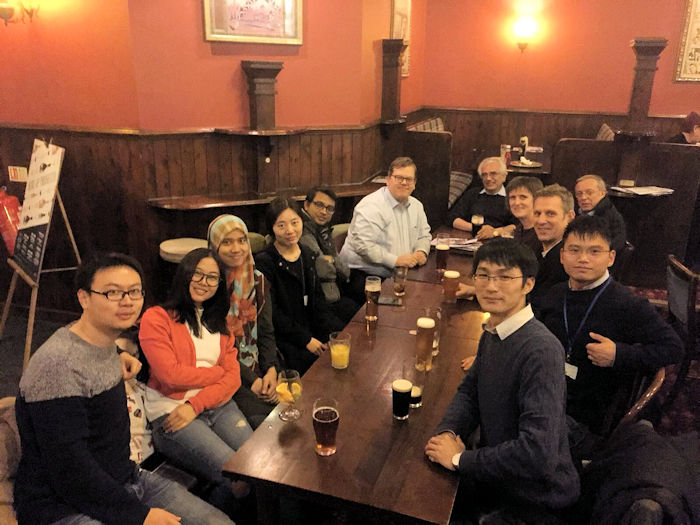
September 2017: Group garden party
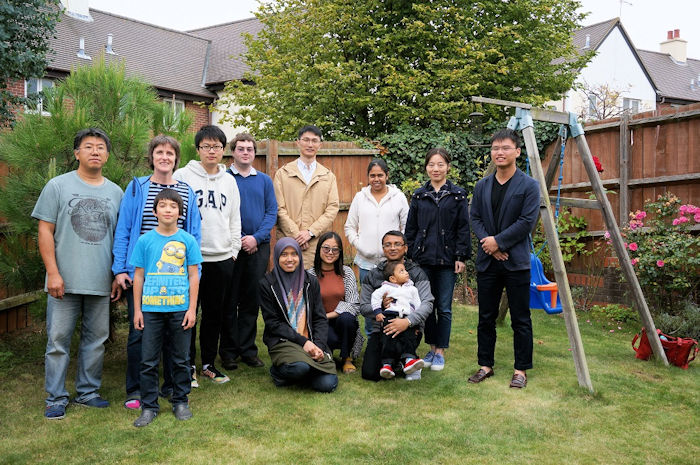
July 2017:
Paper accepted: Zhang, De-Wen; Wu, Fan; Krause, Steffi, "LAPS and SPIM imaging using ITO coated glass as the substrate material", , Analytical Chemistry, DOI: http://dx.doi.org/10.1021/acs.analchem.7b01898
April 2017:
Paper accepted: Fan Wu, Inmaculada Campos, Steffi Krause "Biological imaging using light-addressable potentiometric sensors (LAPS) and scanning photo-induced impedance microscopy (SPIM)", Proceedings of the Royal Society A
March 2017:
Paper accepted: Fan Wu, De-Wen Zhang, Jian Wang, Michael Watkinson, Steffi Krause “Copper contamination of self-assembled organic monolayer modified silicon surfaces following a “click” reaction characterized with LAPS and SPIM”, Langmuir, http://dx.doi.org/10.1021/acs.langmuir.6b03831
August 2016:
Paper accepted: De-Wen Zhang, Fan Wu, Jian Wang, Michael Watkinson, Steffi Krause “Image detection of yeast Saccharomyces cerevisiae by light-addressable potentiometric sensors (LAPS)”, Electrochemistry Communications, http://dx.doi.org/10.1016/j.elecom.2016.08.017
July 2016:
Fan, Dewen and Inma present their work at the Engineering of Functional Interfaces (EnFi) meeting in Wildau, Germany (https://www.th-wildau.de/enfi2016/enfi20160.html).
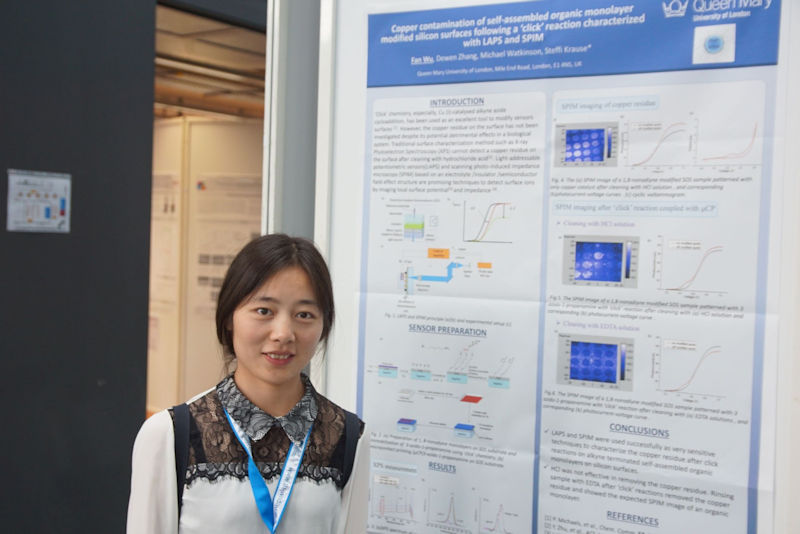
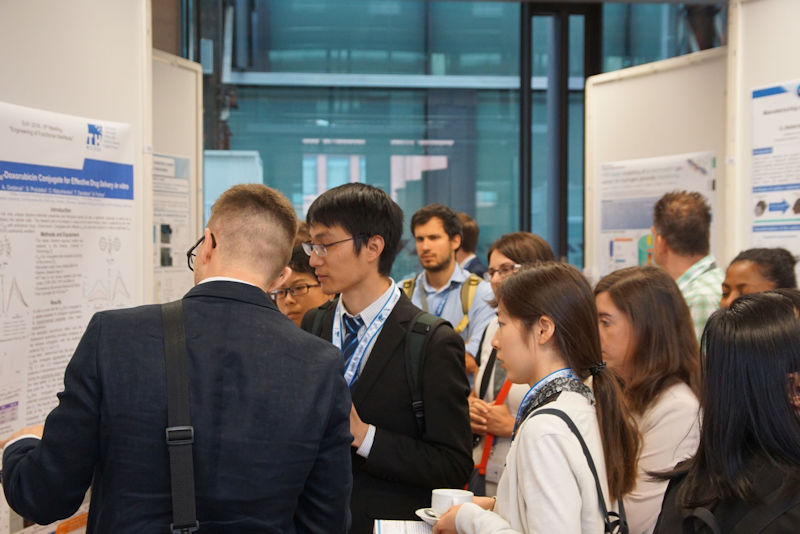
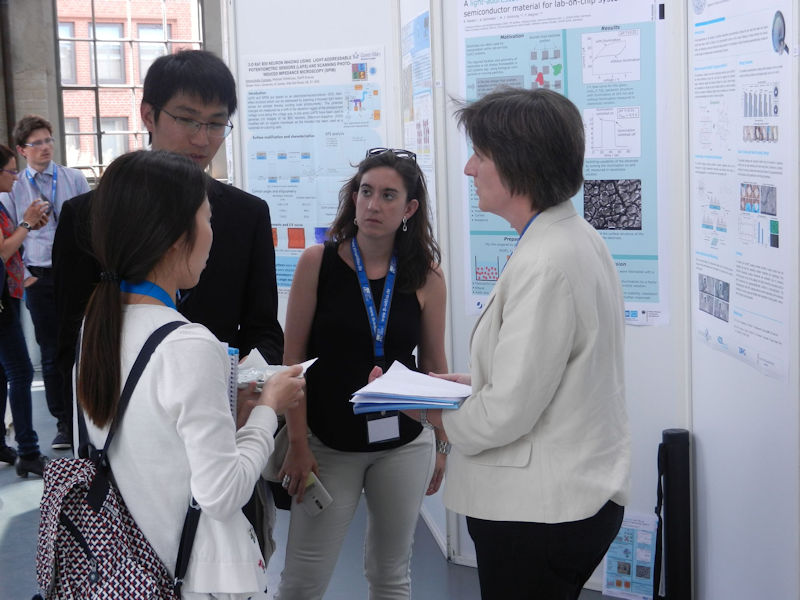
May 2016:
Paper accepted: Jian Wang, Inmaculada Campos, Fan Wu, Jingyuan Zhu, Gleb B. Sukhorukov, Matteo Palma, Michael Watkinson, Steffi Krause, “The effect of gold nanoparticles on the impedance of microcapsules visualized by scanning photo-induced impedance microscopy”, Electrochimica Acta, http://dx.doi.org/10.1016/j.electacta.2016.05.017

